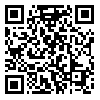BibTeX | RIS | EndNote | Medlars | ProCite | Reference Manager | RefWorks
Send citation to:
URL: http://irj.uswr.ac.ir/article-1-581-en.html
2- Substance Abuse and Dependence Research Center, University of Social Welfare and Rehabilitation Sciences, Tehran, Iran.
Objectives: The present study examined excessive internet use of youths with moderate Cerebral Palsy (CP) and their psychological states in Sensation Seeking (SS).
Methods: This study followed descriptive and correlation research design. Individuals aged 15 to 25 years with CP who were referred to Tehran rehabilitation centers were considered in the study. The study sample (n=150) was randomly divided into two groups of internet dependents (n=75; boys=45 and girls=30) and non-dependents (n=75; boys=45 and girls=30). Internet Addiction Test and Sensation Seeking Scale have been used for data gathering. Data were analyzed by using Pearson correlation coefficients, multivariable regression, x2 and T tests.
Results: Compared to non-dependents, the internet dependent group reported significantly more negative internet influences on daily routines such as clinical problems, poor school performance, regular nutrition, and relation with friends and family members. Both the groups pointed that internet use enhanced virtual peer relationships and provided up-to-date information. Internet dependents (both gender) scored significantly higher on disinhibition sensation seeking subscale than the internet non-dependents. However, these two groups (both gender) did not demonstrate significant differences in life experience seeking and thrill and adventure seeking subscales, but their differences were sizable.
Discussion: It seems that internet applications direct or indirectly motive users to be online for more hours than necessary. This is true for CP patients given their motor impairment. Based on this research result, it seems that persons with CP because of lack of physical activities, motive by internal stimulus and seeking their sensation from external stimulus like internet application as well as for person with CP surfing in internet world and spent too much time on the internet is leisure time not activity time.
Received: 2016/11/14 | Accepted: 2017/03/10 | Published: 2017/08/1








